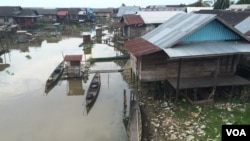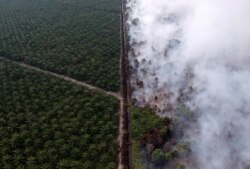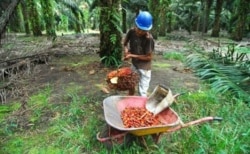To environmentalists, palm oil is a scourge that causes profit-seeking corporations to burn forestland for planting, thereby polluting the atmosphere with greenhouse gases.
To Indonesian farmers, the commodity is a lifeline to support their families and less polluting than some of the alternatives.
The opposing sentiments have caused Indonesia to lock horns with the European Union, which wants to purchase less of the oil. However EU companies still want to do business in the archipelago nation so they are laboring to improve the relationship despite the oily argument.
Last month the EU ASEAN Business Council and European Chamber of Commerce met with President Joko Widodo, celebrating the fact that they were the first foreign chambers to have such a conference with the newly-reelected president. The organizations have companies all across the Association of Southeast Asian Nations.
"We continue to encourage both the European Commission and the countries in ASEAN to have a constructive dialogue on this issue in order to resolve the misconceptions on both sides,” Chris Humphrey, executive director of the EU-ABC, said. “The EU has not banned palm oil. However, there are understandable concerns in Southeast Asia about the EU's position, which needs to be discussed and fully understood. Equally, the EU needs to recognize the significant advances the region has made on sustainability in palm oil production."
From bread to cars
Palm oil has become a source of one of the biggest political arguments between the EU and Indonesia. It has become a commodity that is so widely consumed that people can find it in everything from moisturizer to loaves of bread to car diesel.
However the argument started after the EU said it wants to consume less of the oil, citing environmental reasons. In March, Brussels said palm oil should not be included in the EU goal to transition from fossil fuels to biofuel. This is not exactly a ban but Indonesia is a big exporter of palm oil so it is worried about the economic impact. Such has the argument escalated that Indonesia has subsidized oil palm companies, the EU has responded with anti-subsidy tariffs, and Indonesia is threatening to retaliate with tariffs on EU exports such as milk.
Indonesian farmers need help to grow oil palms sustainably, or to transition to other work, according to the Center for International Forestry Research.
“Rapid expansion is causing damaging changes to the landscape, but farmers are also becoming trapped, as they become highly dependent on a monoculture crop,” Nabiha Shahab and Dominique Lyons wrote in a blog for CIFOR.
European companies in Indonesia have labored not to take sides in the argument. Instead they have moved the focus to how they want to work with the president and the people. They recommended assisting with training people for a future economy more dependent on technology, as well as with making the economy more “inclusive” and “equitable.”
“EuroCham Indonesia stands ready to be a partner to the president and to his team as Indonesia embarks on a roadmap for economic transformation,” Corine Tap, chairwoman of EuroCham, said.






